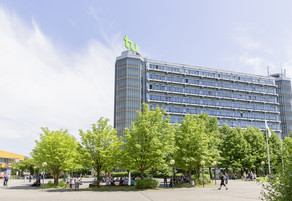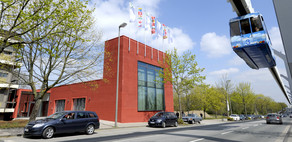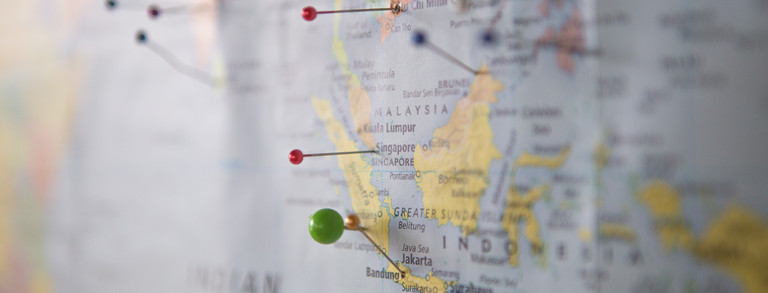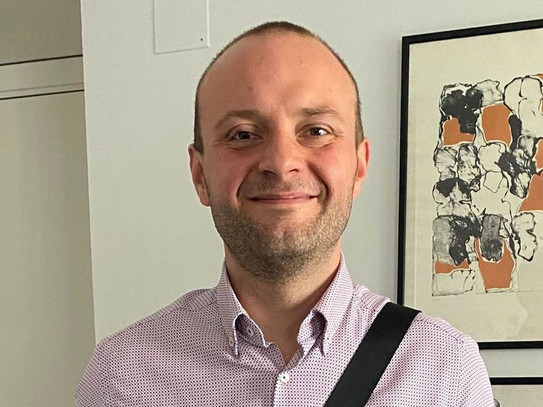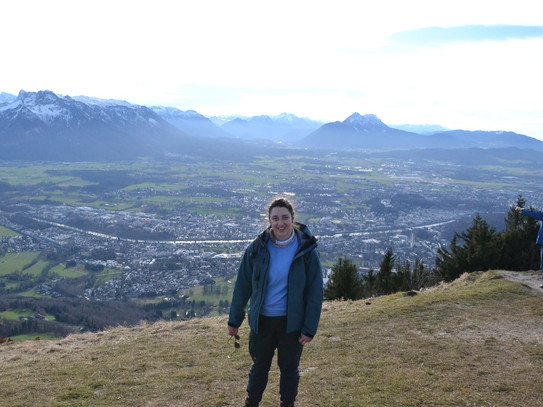Erasmus+ Teaching Staff Mobility
The EU education program Erasmus+ has been promoting cross-border mobility of students and university academic and non-academic staff since 1987. In addition, diverse cooperation and partnership programs offer far-reaching opportunities for institutional exchange between universities in Europe and worldwide.
Teaching staff at TU Dortmund University can apply for an Erasmus+ mobility grant via the International Office. The prerequisite for teaching abroad is a valid Erasmus+ Inter-Institutional Agreement and consultation with the Erasmus+ Departmental Coordinator.
Well Informed
- Professors and lecturers with a contractual relationship with TU Dortmund University
- Lecturers without endowment at TU Dortmund University
- Adjunct lecturers at TU Dortmund University
- Academic staff of TU Dortmund University
Program Countries:
27 Member States of the European Union (EU)
Belgium | Bulgaria | Denmark | Estonia | Finland | France | Greece | Ireland | Italy | Croatia | Latvia | Lithuania | Luxembourg | Malta | Netherlands | Austria | Poland | Portugal | Romania | Sweden | Slovakia | Slovenia | Spain | Czech Republic | Hungary | Cyprus
6 Countries outside the EU
Iceland | Liechtenstein | Northern Macedonia | Norway | Serbia | Turkey| United Kingdom
The partner countries are also clearly listed on the DAAD website. Here there is the possibility to apply for funds via Erasmus+ International Mobility in KA131.
United Kingdom
In the current Erasmus + program generation (2021-2027), the United Kingdom is eligible as a partner country. Due to the international opening of the funding line KA131, outgoing mobilities from Germany to the UK are eligible for both staff and students if TU Dortmund University receives sufficient funds in the corresponding Call.
Each department has Erasmus+ Inter-Institutional Agreements that contractually stipulate student and/or teaching staff mobilities. Therefore, only mobilities for which a corresponding Erasmus+ Inter-Institutional Agreement exists can be funded.
Erasmus+ partner universities (teaching staff mobility)
Erasmus+ partner universities (student mobility)*
*On the linked page you can see who is the Erasmus+ Departmental Coordinator in your department and find out about the opportunities for teaching staff. Of course, the International Office can also provide information about the existing contracts.
Guest lecturers can strengthen the European dimension of the host university through their Erasmus+ mobility, complement its range of courses and impart their specialist knowledge to students who do not want to or cannot study abroad.
Further goals may be:
- Development of a joint study program
- Exchange of teaching content and methods
- Strengthen and develop links between faculties
- Preparation of future cooperation projects
- Participants belong to the group of people mentioned (see "Who Can Apply?")
- Only for teaching stays (not for conference participation!)
- An Erasmus+ Inter-Institutional Agreement must exist for the relevant subject
- At least two consecutive days (excluding travel days) | maximum six weeks or the number of days agreed upon in the Inter-Institutional Agreement
- The stay must include at least 8 hours of lessons in one week or shorter
- For each additional working day beyond one week (five working days), the minimum number of hours per additional day is calculated as follows: eight hours divided by five days multiplied by the number of additional days
- If teaching activities and further education (Fort- und Weiterbildung) are combined, the teaching load is reduced to four hours per week
Accommodation expenses
Depending on the group of countries, the following uniform daily rates apply until the 14th funding day:
- Group 1 (Denmark, Finland, Ireland, Iceland, Liechtenstein, Luxembourg, Norway, Sweden, United Kingdom*): EUR 180
- Group 2 (Austria, Belgium, Cyprus, France, Greece, Italy, Malta, Netherlands, Portugal, Spain): EUR 160
- Group 3 (Bulgaria, FYR of Macedonia, Croatia, Czech Republic, Estonia, Hungary, Latvia, Lithuania, Poland, Romania, Slovakia, Slovenia, Turkey): EUR 140
from the 15th to the 60th day of support, the support amounts to 70 percent of the daily rate:
- Group 1 (Denmark, Finland, Ireland, Iceland, Liechtenstein, Luxembourg, Norway, Sweden, United Kingdom*): EUR 126
- Group 2 (Austria, Belgium, Cyprus, France, Greece, Italy, Malta, Netherlands, Portugal, Spain): EUR 112
- Group 3 (Bulgaria, FYR of Macedonia, Croatia, Czech Republic, Estonia, Hungary, Latvia, Lithuania, Poland, Romania, Slovakia, Slovenia, Turkey): EUR 98
*Staff mobilities to the UK can still be funded as a partner country.
Travel expenses | Unit costs for outward and return journey
In addition to the daily rates, travel costs are added depending on distances between the starting point and destination of the mobility, which are determined uniformly using the Distance Calculator. Reimbursment per stay and depending on the distance with the amounts listed below. Furthermore, additional funding is possible within the framework of individual support for sustainable travel in the course of "Green Travel". Eligible are all participants who need longer time for the trip due to the use of sustainable means of transport. You can also receive up to 4 additional days of funding under the individual support if you need longer time for the trip due to the use of sustainable means of transport.
- 10 - 99 km: 20 EUR
- 100 - 499 km: 180 EUR (for "Green Travel": 210 EUR)
- 500 - 1,999 km: EUR 275 (for "Green Travel": 320 EUR)
- 2,000 - 2,999 km: EUR 360 (for "Green Travel": 410 EUR)
- 3,000 - 3,999 km: EUR 530 (for "Green Travel": 610 EUR)
- 4,000 - 7,999 km: EUR 820
- 8.000 km and more: 1.500 EUR
Important notes
The Erasmus+ Mobility Grant includes the subsistence and travel costs, which are subsidized by the EU Commission / DAAD as unit costs, as shown above. The recipient of the grant is obliged to pay personal tax on any positive differences between real costs and unit costs.
Please contact Andrea Schöne if you have special needs, as the International Office may be able to apply for additional grants.
There will be no reimbursement of travel expenses within the framework of the LRKG NRW!
Due to the limited funds available, if several lecturers of one department travel to a host university for the same period of time, only one person may be eligible for support as described above. Each additional person would then possibly receive 50% of the accommodation and travel costs. However, if sufficient budget is available, multiple trips to a host university can be made at the same time period. Please contact Andrea Schöne.
Before the mobility
The planned teaching staff mobility must be applied for by e-mail through the International Office (Andrea Schöne) at least six weeks before the planned stay. Please state the planned working days abroad, date of arrival and departure, actual place of arrival and departure and name of the host university.
Once you have received confirmation that the mobility is eligible for Erasmus+ funding, please submit the following documents to Andrea Schöne:
- Invitation from the host university
- Online Acceptance Form and Mobility Agreement (in English)
- Request for a business trip via SAP (you will receive the relevant information from the International Office / Andrea Schöne!)
If all documents are complete, the lecturer will receive a Grant Agreement with the funding guidelines, which must be signed and returned to the International Office / Andrea Schöne.
For your mobility, TU Dortmund University must apply for an A1 certificate (within the EU) / Certificate of Secondment (outside the EU), which you must carry with you during your stay abroad. This certificate is automatically applied for by the Department 3.2 with your SAP business trip application to the health insurance company.
Travel safety: The decision to travel to risk areas lies with you and TU Dortmund University, taking into account the regulations of the Erasmus+ program, the institution's internal strategies and the respective crisis management. This also means that you must inform yourself about the current situation in the host country on the website of the Federal Foreign Office and consult with the International Office before you begin your stay abroad.
During the mobility
- Certificate of Attendance be issued by the host institution at the end of the Erasmus+ mobility period
After the mobility
- Send copies of the travel documents together with the original Certificate of Attendance to the International Office (within two weeks after the end of the business trip)
- The link to the EU online survey will be sent directly to you by the EU Commission via e-mail
The Erasmus+ program is also open for mobilities with selected universities in Erasmus+ partner countries. Here, departments can apply for Erasmus+ mobility grants in the framework of existing Departmental Cooperations until March 31 for the following academic year. This line is called Erasmus+ International Mobility.
Teaching Staff Mobilities in a partner country are only possible through the contact person in the department responsible for the relevant cooperation and who has submitted and received approval of an application for funds in International Mobility in KA131.
The administrative procedures hardly differ from the administrative steps mentioned here. Participants will be informed individually by the International Office about the procedures via e-mail.
If you have any questions, please contact Silke Viol directly.
Testimonials
Lukas Brandt, Research Assistant, Didactics of Social Sciences
My stay in Salerno, Italy as part of the Erasmus+ Teaching Staff Mobility was a very positive experience. I particularly enjoyed gaining insights into the peculiarities of the Italian academic system as a guest lecturer and exchanging ideas with colleagues and students about teaching subjects and research topics. I can recommend the Erasmus + program without hesitation to anyone who has ever wanted to travel abroad for teaching purposes.
Marléne Baumeister, Mathematical Statistics and Industrial Applications
With the Erasmus+ Teaching Staff Mobility I spent 2 weeks in Salzburg at the Paris Lodron University. There I visited the research group of Arne Bathke, with whom my PhD supervisor Markus Pauly cooperates a lot. I had the opportunity to teach a course on a topic that I am also involved in with my research. In addition, I was able to get to know some other PhD students in the field of statistics and gather new ideas for my own research.


![Eat & Read [Translate to English:]](/storages/international/r/Bilder/Veranstaltungen/Eat___Read/waffel_plain_buecherturm.jpg)





